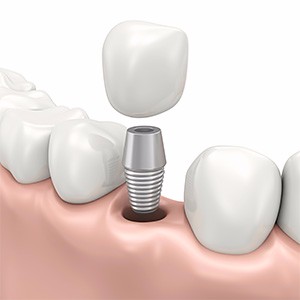
Tooth loss affects millions of Americans. While traditional bridges and dentures are effective, dental implants are often a superior option for a natural looking permanent replacement for missing teeth.
What is a dental implant?
Dental implants are small titanium posts that replace the roots of missing teeth. The implant is surgically placed into the jawbone providing a foundation for a replacement tooth or multiple teeth. As little as two or four implants is all that is needed to replace an entire arch of teeth.
What are the benefits of dental implants?
Implants function like tooth roots and offer incredible stability which means your denture, bridge or crown will not slip out of place while chewing or talking. Dental implants are often as strong or stronger than the natural tooth and therefore are the next best thing to your natural tooth.
When natural teeth are missing your jaw loses bone tissue. Dental implants are the only restorative option that can prevent the side effect of bone loss from missing teeth.
Dental implants can improve your confidence by giving you back a natural looking smile without the worry that the restoration will shift or slip while chewing, speaking or smiling.
Dental implants are non-evasive to neighboring teeth making them a healthier option than traditional fixed bridges.
Are dental implants expensive?
Initially, dental implants are more expensive than other tooth replacement options such as dentures or bridgework. But they also last many years longer and may never need replacement, so they offer the best long-term investment.
Does my insurance cover dental implants?
Most insurance plans have coverage for dental implants. Wherever your insurance coverage ends, interest free financing options are available to help make dental implants fit your budget.
How long does it take to get dental implants?
Dental implants can take up to 6 months from the initial consultation to placement of the final restoration. Following the implant surgery, your bone typically requires 4 months to fully integrate into the bone before the final restoration can be placed.
Is dental implant surgery painful?
Pain tolerance varies from patient to patient, but most patients find it very easy to tolerate. Any mild discomfort can usually be managed with over-the-counter anti-inflammatory medication.
How do I care for dental implants?
Dental implants require the exact same care as natural teeth. This includes brushing and flossing regularly, professional teeth cleaning and regular checkups. While routine checkups are always important, they are especially important with dental implants. Although the implant will never decay, the gum tissue around them can become infected which could lead to bone loss causing the implant to become loose.
Can my body reject a dental implant?
Dental implants do not contain any living cells and therefore can fail to integrate with the bone and be rejected by the body. However, this is rare. Dental implants regularly achieve success rates in excess of 95% and the titanium they are made of is completely biocompatible.
How long do dental implants last?
Dental implants can last a lifetime with proper care and maintenance. Regular dental checkups and good oral hygiene habits can help ensure longevity of your implant.
Am I a candidate for dental implants?
While dental implants are a great option for many patients, they may not be suitable for everyone. Factors such as bone density, overall health and lifestyle habits can impact a patient’s candidacy for dental implants. Schedule your free consultation to find out if dental implants are right for you!